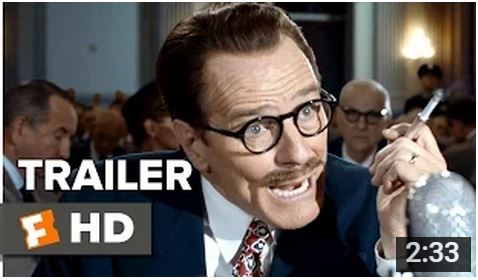Film Review: Praising "Trumbo"

Director Jay Roach, known for lighter fare like the Austin Powers series and Meet The Fockers, has taken on a heady subject, no less than the most famous communist in Hollywood history – Dalton Trumbo. But it’s apparently now popular (and safe, since we have newer enemies) to praise one of America’s most brilliant Oscar winning screenwriters, who gave us such classics as Tender Comrade, Roman Holiday, Spartacus, Exodus and The Sandpiper, to name a few. Of course, most of them since were under assumed names, since he was a prime victim of the Hollywood Blacklist that punished artists for being members of the Communist Party. But Trumbo, along with a few others, were distinct from the rest – they refused to name names, and paid dearly for it.
The new film covers the span of time leading up to anti-communist hysteria in 1947, right after WWII when our ally, the Soviet Union suddenly became our enemy. Those who had written screenplays praising the USSR or supported union workers against the studio bosses were now suspect, and any of their friends and associates were considered enemies of the State. Trumbo refused to testify in front of the House on Un-American Activities Committee and was found guilty for contempt of court and served prison time. Many who paid the price of naming names may have retained their jobs but lost the respect of the progressive community.
When released from 11 months in prison, Trumbo couldn’t get any work under his own name, and made much less using assumed names. The stress on Trumbo’s family and work during the blacklisting period are covered up until the time in 1960 that his name finally appears on screen, thanks to the determination of supporters like Kirk Douglas (Spartacus) and Otto Preminger (Exodus).
Click on the image above to view the film's official trailer.
Ironies abound as the new film, Trumbo, is featured on the front page of the Hollywood Reporter, with the blaring title, Cranston (The Communist)! The Reporter was a major subscriber to the witch hunt of the 40s in Hollywood and now we find it praising his life and work. Cranston refers to the actor Bryan, from the hit TV series Breaking Bad, who here captures the chain-smoking, committed communist in a feisty, charismatic portrayal. The film also addresses Trumbo’s contradiction as the wealthiest screenwriter in Hollywood who was often called ironically ‘the commie with the pool,’ or ‘the swimming pool socialist.’
His battles with witch hunter gossip columnist Hedda Hopper provide moments of comic relief, as Helen Mirren plays the role to the hilt. Although it was the avid anti-communist John Wayne who in reality gave Hollywood Lefties the most aggravation, it was apparently decided by the producers that challenging this iconic figure might jeopardize a wider audience for the film, although his portrayal as a secondary figure in the film is a highpoint.
Cranston’s portrayal is often over the top and exaggerated, and he looks little like the diminutive Trumbo, save for his black rimmed glasses, mustache and cigarettes. But he carries the role with joy in a stylish manner. The well-written John McNamara script about one of the greatest scriptwriters, does justice to Trumbo, incorporating his acerbic wit, while employing many aphorisms and quotes from contemporaries.
John Goodman provides another over the top portrayal of B-movie producer Frank King who employs Trumbo during his darker days, when he’s desperately in need of funds and willing to allow others to put their names on his often brilliant scripts.
Like many great scripts, the film ends with an emotional speech by the hero, this time saying something like we shouldn’t look for heroes or villains from that period, but only victims. Director Roach feels that anti-communist hysteria is still alive but the name has have been changed to persecute the innocent. Now we have ‘terrorists’ and many innocent people are victims. It’s important now more than ever to tell the story of a person in Hollywood who was willing to sacrifice much for his ideals of a better world, and persevered to accomplish these goals.
"Trumbo" opens in theaters around the country the first week of November. Check your local listings.
[Bill Meyer is a musician, writer and producer of progressive multimedia events. He travels worldwide performing jazz with several groups. A longtime political activist and aficionado of progressive cinema, Meyer usually writes on the culture pages of the People's World and other journals, and primarily reports on film festivals.]

